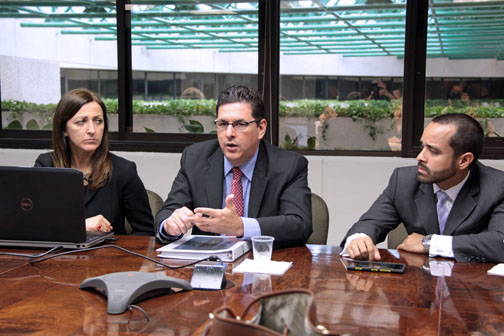Study: Puerto Rico is ideal site for high-tech ventures

Puerto Rico is a hospitable place when it comes to protecting intellectual property (IP) rights, which coupled with incentives and favorable business conditions, make the island an attractive place to set up and expand high-tech firms, a study commissioned by Microsoft Corp. conducted by “The Economist” revealed Monday.
The study by the magazine’s Intelligence Unit titled “Protecting intellectual property in Puerto Rico: Progress and challenges” was conducted between July and August 2013, and presents a deep analysis of the intellectual property scenarios in Panama, Costa Rica, the Dominican Republic and Puerto Rico.
As per its key findings, Puerto Rico has a robust IP legal base, owing to its integration into the U.S. legal and regulatory framework.
“It is consistently highly ranked in terms of IP protection. While Puerto Rico has its own local system to manage intellectual property, more local legislation could be implemented to improve the IP framework beyond its current standard,” the study noted.
Puerto Rico also boasts an incentive-based innovative economy, which offers considerable support, from both the public and private sectors, for research and development and patent creation.
“It offers an attractive business environment for high-tech business creation. This is supported by a highly educated workforce and considerable research resources,” the study said.
In spite of the favorable conditions, Puerto Rico is seemingly lagging behind when it comes to registering for patents. In 2012, the island registered 39 patents, up slightly from the 33 on record for 2005.
“Patents is one of the ways for a country to capture innovation,” said Irene Mia, regional director for Latin America and the Caribbean for The Economist Intelligence Unit. “The number of patents Puerto Rico registers each year is not as high as could be expected taking into consideration its focus on innovation.”
Last year, Puerto Rico invested $448.6 million in research and development activity, which represents 0.49 percent of the Gross Domestic Product, leaving much room for improvement when the island is compared to the average investment of 0.7 percent in Latin America and more than 2 percent in the U.S. mainland.
One way to increase the level of innovation is by creating industry clusters to include participation by major players as well as local firms as service providers, Puerto Rico Industrial Development Company Executive Director Antonio Medina said Monday.
“Perhaps in the past, there wasn’t enough emphasis placed on clustering, particularly in the area of biosciences. However, Pridco’s strategy now calls for spurring clustering in emerging areas such as aerospace and information technology, and inasmuch as we can get that to happen, we may see an increase in patent activity,” he said.
Meanwhile, Yamille Morales, director of new technologies and innovation for Microsoft Puerto Rico, confirmed that island entrepreneurs are actively developing applications and other technological innovations that often do not make it to the patent stage for one of two reasons.
“There is either a lack of education about what can be registered or there is a fear of sharing their idea so that it is not pirated, which leads to nothing happening,” Morales said. “Educating is something that we in the private sector are committed to supporting. We have to deliver the information and generate trust among these entrepreneurs, especially our youth.”

Federal enforcement agencies have stepped up efforts and funding for IP protection but online piracy remains a significant problem in Puerto Rico, the study says.
Piracy remains significantly high
Another form of piracy, software counterfeiting, is another major obstacle that Puerto Rico must overcome to get ahead, the study showed.
Although much of Puerto Rico’s legal framework and IP enforcement system are well-developed, software piracy still proves to be a difficult issue to address, remaining at 42 percent in 2011.
“Despite increased enforcement, the risks from online piracy remain low, while the benefits are generally high. Debate over this issue remains vitriolic in the U.S., as proponents of stricter regulations quarrel with digital rights activists,” the study stated.
“One potential remedy would be to enact legislation to allow Puerto Rico to treat piracy as a form of tax evasion. Similar legal frameworks in other countries have been correlated with curbed piracy rates and also may boost tax revenue,” the study concluded.
To that end, Medina and Economic Development and Commerce Secretary Alberto Bacó confirmed that the central government will be working with companies to evaluate bills that could address the piracy issue.
While software piracy remains low in Puerto Rico when compared to other Latin American countries, the illegal activity still represents $44 million in losses for businesses and the island. Cutting down on the problem requires improving copyright laws online as well as increasing responsible personnel on intellectual property laws, among other steps.
Microsoft will use the research to engage in discussions with policymakers, government officials, and other stakeholders on the overall IP environment, how the IP protection environment in a country compares with other selected geographies, and best practices for IP protection.







